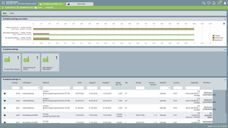Johns Hopkins University School of Medicine Presentation Highlights SELDI Technology for Proteomic Analysis in Kidney Transplant
Ciphergen's ProteinChip® System enables discovery of multiple biomarkers and predictive assay for kidney transplant rejection
Fremont, CA. Ciphergen Biosystems, Inc. (Nasdaq:CIPH) announced today the recent report of a promising study in kidney transplantation enabled by Ciphergen's SELDI ProteinChip® System. The findings were enabled by the use of proteomic pattern discovery and recognition methodologies pioneered by Ciphergen's Biomarker Discovery Center® joint venture with the Johns Hopkins School of medicine. This methodology was used to develop the basis of a simple urine test that identifies impending kidney failure or rejection following transplant surgery - a potential alternative to kidney biopsies for renal transplant patient monitoring.
Dr. Dan Chan, Professor of Pathology, Oncology, Urology, and Radiology at Johns Hopkins School of Medicine, commented, "SELDI proteomics discovers the most predictive biomarkers from a large number of marker candidates, potentially giving it significant advantages over conventional proteomic methods. The SELDI proteomics approach rapidly discovers the best markers and translates them to a SELDI-based assay using a single platform and process."
On May 16th of this year, researchers from the Johns Hopkins University School of Medicine provided a special invited lecture to the American Transplant Congress in Boston, Massachusetts in which they reported finding thirteen potential protein biomarkers present in greater concentrations in urine samples from patients who had organ rejection following kidney transplant than were present in most non-rejection samples. Three other potential biomarkers were found to be lower in patients' urine with the onset of transplant rejection. A separate analysis using a combination of biomarker candidates in a panel correctly identified 91% of the 34 urine samples from 32 kidney patients at various stages after transplantation. As a potential alternative to expensive and painful kidney biopsies, frequent non-invasive monitoring through a urine-based, multi-biomarker panel could allow doctors to better tailor immunosuppression drugs according to individual patient's needs, prescribing lower doses to more stable patients or increasing doses for patients who show early signs of rejection.
"This has the potential to change the way transplant patients are managed," said study co-author Ernesto P. Molmenti, M.D., Ph.D., associate professor of surgery at Johns Hopkins. "Frequent, noninvasive monitoring could allow doctors to more rapidly respond to patients who show early signs of rejection."
In this study, urine samples were collected from 17 transplant recipients with acute rejection and 15 patients with no rejection. Processed urine samples were analyzed in triplicate by SELDI using immobilized metal affinity (IMAC3) and hydrophobic (H4) ProteinChip Arrays. Mass spectra generated by SELDI were subjected to bioinformatics analysis both by ProPeak (a program developed by Dr. Zhen Zhang at Johns Hopkins) and Ciphergen's Biomarker Patterns(TM) Software. Initial data analysis revealed 45 peaks that showed the ability to distinguish between rejection and nonrejection urine samples. From these peaks of interest, 16 peaks showed promise as transplant rejection biomarkers. Ultimately, a multiple-biomarker panel was utilized to achieve the correct stratification of 91% of the samples.
"Unlike kidney biopsy, which can cause significant complications in transplant patients, a urine test is risk-free, presents no discomfort for the patients, and samples the entire kidney accurately," stated study co-author William Clarke, Ph.D., assistant professor of pathology at Johns Hopkins.
Topics
Organizations
Other news from the department science
These products might interest you

Limsophy by AAC Infotray
Optimise your laboratory processes with Limsophy LIMS
Seamless integration and process optimisation in laboratory data management

ERP-Software GUS-OS Suite by GUS
Holistic ERP solution for companies in the process industry
Integrate all departments for seamless collaboration

Get the life science industry in your inbox
By submitting this form you agree that LUMITOS AG will send you the newsletter(s) selected above by email. Your data will not be passed on to third parties. Your data will be stored and processed in accordance with our data protection regulations. LUMITOS may contact you by email for the purpose of advertising or market and opinion surveys. You can revoke your consent at any time without giving reasons to LUMITOS AG, Ernst-Augustin-Str. 2, 12489 Berlin, Germany or by e-mail at revoke@lumitos.com with effect for the future. In addition, each email contains a link to unsubscribe from the corresponding newsletter.
Most read news
More news from our other portals
Last viewed contents
Pall Opens New Life Sciences Centre of Excellence in Shanghai

DNA nanotubes build a bridge between 2 molecular posts

Protein could help in early detection of malignant Hodgkin's lymphoma

Hypertrust Patient Data Care GmbH - München, Germany
Perceptronix Announces Completion of ClearVu Elite Clinical Study

Test detects signs of Lyme disease near time of infection
Unravelled potato genome paves the way for new varieties

Nursery of the Blood: How Stem Cells Calm the Body’s Immune Response - The researchers uncovered an unexpected finding
Gregor Mendel Institute of Molecular Plant Biology GmbH - Wien, Austria



















































